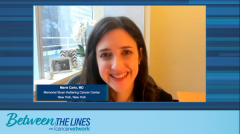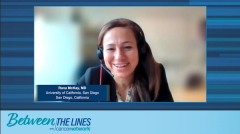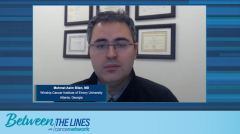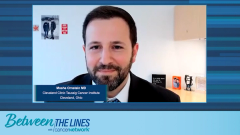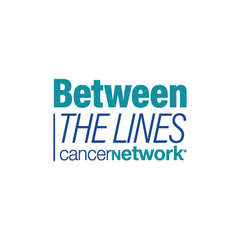
Risk Factors in the Management of Advanced Renal Cell Carcinoma
Possible comorbidities and other risk factors in advanced renal cell carcinoma that would affect potential treatment regimens.
Episodes in this series

Robert J. Motzer, MD: When patients are presenting with RCC [renal cell carcinoma], do you stratify and objectify a risk factor? How do you see that fitting into your management for RCC in your own practice?
Marie Carlo, MD: The dilemma is that we have several regimens that work quite well, so how to pick and choose. I agree with some other folks, and we were fortunate that we had early experience with this combination treatment when we participate in the early phase trial and I’m quite familiar with the dose and dose adjustments. That’s the most important thing when you’re choosing one of these combinations. It’s one that you’re quite familiar with that you are familiar with dose adjustments and the adverse effects because as you can see from the data, even though they’re both anti-VEGF [vascular endothelial growth factor], there are differences between sunitinib [Sutent] and lenvatinib [Lenvima] and the others in terms of adverse effects. With sunitinib, we see more dysphonia. If I had a patient who’s a singer, which I’ve had, then you may want to choose a regimen that dysphonia is a lower risk. This regimen is effective in all risk groups, so I don’t select one regimen in particular. I discuss this type of regimen with all risk groups, obviously in the intermediate and poor risk. I also present the idea of ipilimumab [Yervoy] and nivolumab [Opdivo] and discuss the pros and cons of each regimen with the patient. I’ve also been more aggressive about patients with a history of mild autoimmune disease, still thinking about IO [immuno-oncology] therapy. For example, a few years ago these patients were probably borderline eligible for the trials who’ve had a history of some colitis or psoriasis. Especially our subspecialists have become very knowledgeable with these agents and preemptively I do send patients who, for example, had a possible diagnosis of Crohn disease to the gastroenterologist for evaluation and co-management. I’ve been successful in treating a few patients with a history of mild autoimmune disease with IO. I do use the help of my colleagues in different [departments], dermatologists, gastroenterologists, because as you said, the benefit and overall survival is there and I want to make sure I evaluate everything before not giving them that option.
Robert J. Motzer, MD: We were one of the main enrollers in the CLEAR trial. That one of the aspects of this program really struck me was the efficacy. The fact that we still have patients who were treated on that trial, who are doing well on this program and having a durable response, most of the patients have required dose reduction. In this study, the proportion of patients with lenvatinib/pembrolizumab [Keytruda] who had a dose reduction was about 60% and that’s part of the lenvatinib theme is to start out with a high dose for maximized efficacy and then dose reduces needed for toxicities. In your own experience, are there certain patient populations that you see would be problematic to offer lenvatinib/pembrolizumab in addition to the autoimmune issue around lenvatinib in terms of different comorbid conditions that make you more steer away from Lenvatinib/pembrolizumab to one of the other programs?
Marie Carlo, MD: Certainly hypertension. Even with optimally control, if somebody is hypertensive at baseline, we review the regimens, we preemptively increase their antihypertensives and they still can get quite hypertensive with this and that would be a population where I’d be careful in offering this. Certainly, if they’ve had recent cardiac event or stroke, I stay away from these gastrointestinal issues that would put them at risk for perforation, this is another population where I would steer away from the anti-VEGF until at least we get a better disease response. I’m not sure if you have other patients?
Robert J. Motzer, MD: The predominant adverse event that happens early on is hypertension. I agree with you completely. If a patient has uncontrolled hypertension, then I would certainly encourage another regimen. Especially if there are people who have intermediate poor risk, that would be an ideal candidate for ipilimumab/nivolumab. For patients that I’m offering lenvatinib/pembrolizumab to I want to make sure their blood pressure is under good control before we start the regimen and I always counsel them that this is an adverse event that could happen early on within a couple of days and provide them parameters and have them get a blood pressure cuff and take blood pressure at home and call us if there’s a worsening or development of hypertension. That’s when the patients need counseling.
Marie Carlo, MD: Regarding the first question, we start patients on both medications on the same day. They come into clinic, they’ll get education, and then I like to see the patients either 2 or 3 weeks later. If it’s not me, then a nurse practitioner or a physician assistant. I ask the patients to monitor their blood pressure daily at home, and we give them parameters, 140/90 or something like that to call in and to let us know if there’s kind of these consistent BP [blood pressure] readings that are higher. I agree, the blood pressure, maybe some of the mucositis and some of the diarrhea can be more challenging with this regimen. I would say, I don’t really like in the early phases to go more than 2 to 3 weeks without seeing a patient. And that’s also why I start pembrolizumab on the 3 week dosing, so we can have a built in check in every 3 weeks. But of course, by phone, try to do it more frequently.
Transcript edited for clarity.
Newsletter
Stay up to date on recent advances in the multidisciplinary approach to cancer.


